World News

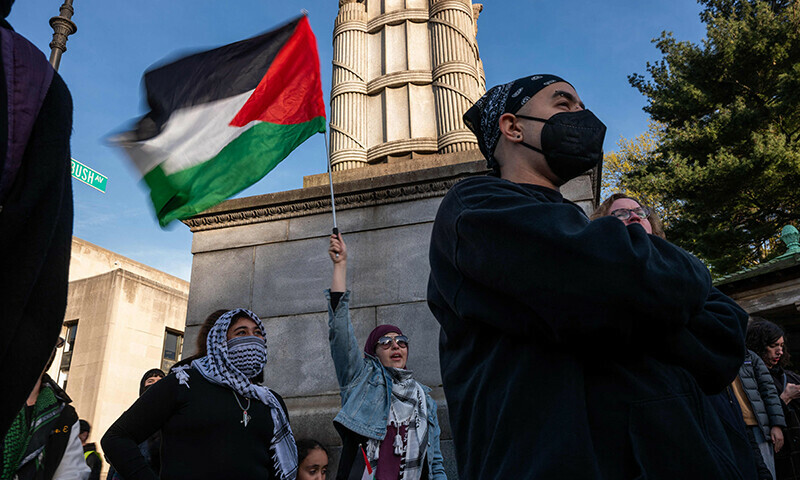
Protests against Israel filled streets in Brooklyn and escalated at universities across the United States, some of which included Jewish Passover Seders, as demonstrators demanded an end to civilian casualties in Gaza.
The growing protests follow mass arrests of demonstrators at some East Coast universities in recent days, and show a deepening dissatisfaction in the United States, historically Israel’s most important ally, with the course of the fighting with Hamas.
Pro-Palestinian protests have followed President Joe Biden, a self-declared “Zionist”, for months. At universities, protests have recently grown to encampments that draw students and faculty of various backgrounds, including of Jewish and Muslim faiths, that host teach-ins, interfaith prayers, and musical performances.
A large Brooklyn street protest reached a standoff on Tuesday when New York police began to arrest people over disorderly conduct, restraining those who refused to move with zip ties.
The Council on American-Islamic Relations criticised the use of police force to stifle dissent, saying it undermined academic freedom.
“So does defaming and endangering Jewish, Muslim and Palestinian … students based on suspiciously inflammatory remarks that a few unidentified, masked individuals have made outside of campus,” Afaf Nasher, executive director of CAIR in New York, said in a statement.
Critics of the protests, including prominent Republican members of the US Congress, have stepped up accusations of anti-Semitism and harassment by at least some protesters. Civil rights advocates, including the American Civil Liberties Union (ACLU), have raised free speech concerns over the arrests.
There have been heated exchanges of words and insults between pro-Palestinian and pro-Israeli demonstrators, particularly in the public streets around Columbia, leading congressional Republicans on Tuesday to demand that Biden do more to protect Jewish students.
Several campus protesters Reuters spoke to attributed the off-campus incidents to rogue provocateurs who are trying to hijack the protests’ message.
“There are no universities left in Gaza. So we chose to reclaim our university for the people of Palestine,” said Soph Askanase, a Jewish Columbia student who was arrested and suspended for protesting.
“Anti-Semitism, Islamophobia and racism, in particular racism against Arabs and Palestinians, are all cut from the same cloth.” Other students blamed universities for failing to protect their right to protest or stand up for human rights.
“As a Palestinian student, I too did not feel safe for the past six months, and that was as a direct result of Columbia’s one-sided statements and inaction,” said Mahmoud Khalil, a Palestinian student at Columbia.
Students at the University of California, Berkeley — a school well known for its student activism during the 1960s — set up tents in solidarity with protesters at other schools.
Columbia University students participate in an ongoing pro-Palestinian encampment on their campus following last week’s arrest of more than 100 protesters on April 23 in New York City. — AFP
Milton Zerman, 25, a second-year student at Berkeley’s law school, who is from Los Angeles, said Jewish and Israeli students have suffered from hateful harassment.
“When you’re an Israeli student on this campus, you feel like you have a target on your back, you feel unsafe and it’s no wonder students from Israel are so hesitant to come here,” Zerman said.
New York police arrested more than 120 protesters at New York University on Monday and more than 100 at Columbia University last week. Columbia cancelled in-person classes at its Upper Manhattan campus on Monday in a bid to defuse tensions.
On Tuesday, Columbia said classes for the rest of the year would be hybrid, with students able to attend online or in person.
Later, the university’s president said it was time to move forward with a plan to dismantle the pro-Palestine encampment, and gave organisers a midnight deadline to do so.
California’s Cal Poly Humboldt, a public university in Arcata, was shut down after pro-Palestinian protesters occupied a campus building.
At the University of Minnesota campus in St. Paul, police cleared an encampment after the school asked them to take action, citing violations of university policy and trespassing law.
Passover protests
Some Jewish demonstrators said they were taking the second night of the weeklong feast of Passover — a holiday feast when families gather and celebrate the biblical account of the Israelites’ freedom from Egyptian slavery — to reaffirm their faith and distance themselves from the Israeli government’s war strategy.
“I don’t see what Israel is doing as self-defence. I see incredible, absolutely unbelievable human rights violations,” said Katherine Stern, 62, of Woodstock, New York, who gave up her family Seder 190 kilometres away to attend the Brooklyn protest.
Protesters want university endowments to divest from Israeli interests and the United States to end or at least condition Israeli military aid on improving the plight of Palestinians.
Israel’s military offensive on Gaza in response to the October 7 Hamas attacks has killed over 34,000 people, displaced nearly all of Gaza’s 2.3 million people and caused a humanitarian crisis.
In Brooklyn, about 2,000 people occupied a plaza near the Brooklyn home of US Senate Majority Leader Chuck Schumer — a staunch Israel supporter and the highest-ranking Jew in the US government — chanting, “stop arming Israel”, “stop funding genocide” and “let Gaza live”.
Protesters block the street near the home of US Senate Majority Leader Chuck Schumer in the Brooklyn borough of New York, calling on Schumer to stop arming Israel, on April 23. — AFP
Organisers staged music and songs from Jewish and other cultures, giving prominence to Canadian author Naomi Klein, a peace activist who drew on her Jewish roots to argue against Zionism, which she called a “false idol”.
“We want freedom from the project that connects genocide in our name,” Klein said to cheers.
“We seek to migrate Judaism from an ethnostate that wants Jews to be perennially afraid … or that we go running to its fortress, or at least keep sending them the weapons and the donations.”
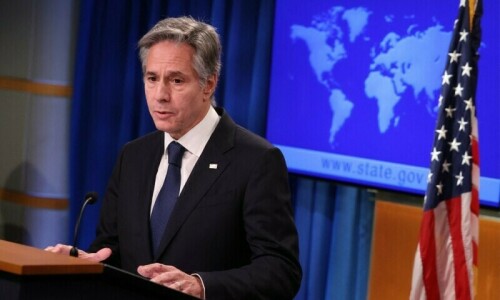
US Secretary of State Antony Blinken was due in China on Wednesday, as the United States ramps up pressure on its rival over its support for Russia while also seeking to manage tensions with Beijing.
The US diplomat will meet China’s top brass on Friday in Beijing, where he is also expected to plead for restraint as Taiwan inaugurates a new leader, and to raise US concerns on Chinese trade practices — a vital issue for President Joe Biden in an election year.
But Blinken is also seeking to stabilise ties, with tensions between the world’s two largest economies palpably easing since his last visit in June.
At the time, he was the highest-ranking US official to visit China in five years, and the trip was followed by a meeting between the countries’ presidents in November.
At that summit in California, Chinese President Xi Jinping agreed to a US wish list including restoring contact between militaries and cracking down on precursor chemicals to fentanyl, the powerful painkiller behind an addiction epidemic in the United States. Blinken will start his visit on Wednesday in Shanghai.
While in the city, he will meet students and business leaders in what an aide called a bid to highlight warm ties between the American and Chinese peoples.
The friendly side trip — the first visit by a US secretary of state to the bustling metropolis since Hillary Clinton in 2010 — would have been unthinkable until recently, with hawks on both sides previously speaking of a new Cold War between the two powers.
Treasury Secretary Janet Yellen similarly toured the manufacturing hub of Guangzhou before visiting Beijing earlier this month.
Pressing on Russia
A senior US official previewing Blinken’s trip said that the United States and China were at a “different place than we were a year ago, when the bilateral relationship was at an historic low point”.
“We also believe, and we have also clearly demonstrated, that responsibly managing competition does not mean we will pull back from measures to protect US national interests,” he said.
The Biden administration’s eagerness to engage China stands in stark contrast to its efforts to isolate Russia since its invasion of Ukraine in February 2022.
After initially being pleased that Beijing has not directly supplied weapons to Russia, the United States in recent weeks has accused China of lavishing industrial material and technology on Moscow.
Washington has encouraged European leaders, including German Chancellor Olaf Scholz, who recently visited Beijing, to stand firm on China not backing Russia, believing that it wants stable ties with the West as it focuses on addressing economic headwinds at home.
“If China purports on the one hand to want good relations with Europe and other countries, it can’t on the other hand be fuelling what is the biggest threat to European security since the end of the Cold War,” Blinken said Friday after Group of Seven talks in Capri, Italy.
Progress on fentanyl
The Biden administration has trumpeted the agreement with Xi on fentanyl as a success. A State Department official said that since the November summit, China appears to have taken its first law enforcement measures on the matter since 2017.
Blinken will ask for further implementation, the official said.
“More regular PRC law enforcement action against PRC-based chemical companies and pill press manufacturers involved in illicit fentanyl supply chains would send a strong signal of China’s commitment to address this issue,” the official said, referring to the People’s Republic of China.
One source of friction between the two countries is new legislation that cleared the US Congress on Tuesday — and which Biden intends to sign — requiring the wildly popular social media app TikTok to be divested from its Chinese parent company ByteDance, or be shut out of the American market.
Biden faces a rematch in November against former president Donald Trump, who has vowed a more confrontational approach against China.
Yun Sun, a senior fellow at the Washington-based Stimson Center, said that China’s leaders, eager to focus on their economy, were in a wait-and-see mode ahead of the US election.
“The Chinese understand that the Biden administration is unlikely to deliver any good news on trade because that simply does not support the election agenda,” she said. For Chinese leaders this year, “their priority is to keep the relationship stable”.
“Until there is clarity on who the next administration will be, I don’t think they see a better strategy,” she said.
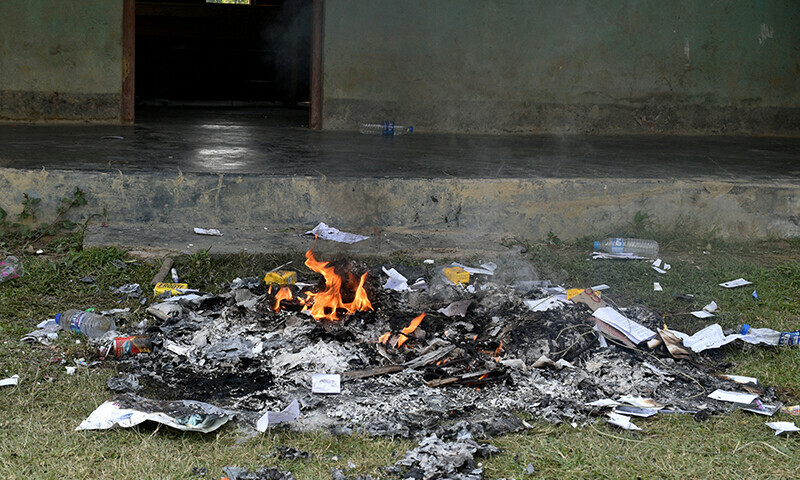
NEW DELHI: Amid reports of violence and damage to voting machines in the Manipur state torn by months of ethnic clashes, India will rerun voting at 11 polling stations in the northeastern state on Monday.
The main opposition Congress party had demanded a rerun at 47 Manipur polling stations, alleging that booths were captured and elections were rigged.
However, election authorities declared the voting void at the 11 locations and ordered fresh poll, the chief electoral officer of Manipur announced.
Prime Minister Narendra Modi is forecast to win a rare third term on the back of issues such as Hindu nationalism.
Clashes among armed groups and attempts to take over polling stations under heavy security were reported on the very first day of voting on Friday in the Manipur state.
Despite the threat of armed clashes that have killed at least 220 people in the past year, voters turned out in large numbers.
Manipur has been roiled by fighting between the majority Meitei and tribal Kuki-Zo people since May. It remains divided between a valley controlled by Meiteis and Kuki-dominated hills, separated by a stretch of no-man’s land monitored by federal paramilitary forces.
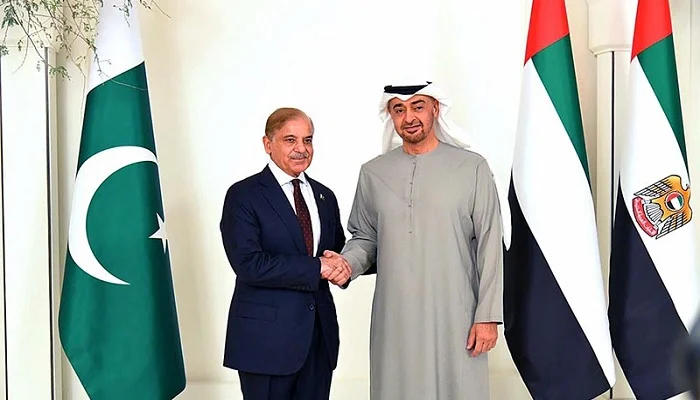
Calling for joint efforts against climate change, Prime Minister Muhammad Shehbaz Sharif on Friday hailed the United Arab Emirates (UAE) leadership for expeditiously responding to the worst rains and flooding in the Middle Eastern nation.
Over 254 millimetres of rain — about two years' worth — lashed the Emirates in days that swamped its urban centers, closing down airports, educational institutes, businesses, and highways.
Official media said it was the highest rainfall since records began in 1949, before the formation of the UAE in the year 1971.
The PM, who held a telephonic conversation with President of the United Arab Emirates (UAE) Sheikh Mohamed bin Zayed Al Nahyan, congratulated him for his government’s timely efforts to control the flooding-related damages that saved lives.
“The Prime Minister’s call was centered on his admiration for the strong resolve and impeccable efficiency with which the UAE leadership had confronted the challenges that had emerged from the recent rains in the country,” according to the statement issued by the PM Office.
PM Shehbaz commended the UAE President for demonstrating his outstanding leadership qualities and his strong commitment to ensuring the welfare of the Emirati people.
“Pakistan has also witnessed heavy rains in recent days, resulting in loss of many precious lives,” the PMO quoted the prime minister as saying.
He called for collective actions to combat the challenge of climate change and suggested that both countries strengthen their collaboration in the field.
“The UAE president expressed appreciation for the prime minister’s good wishes and reciprocated the warm sentiments for the people affected from rains and flooding in Pakistan,” state-run APP reported.
Both leaders reaffirmed their commitment to enhance bilateral cooperation in multifaceted areas.
Record rains
Deaths from heavy rains earlier this week in the UAE rose to four, authorities said on Friday, as well as flooding roads and jamming Dubai's international airport, Reuters reported.
The storm first hit Oman at the weekend, killing at least 20 people, before pounding the UAE on Tuesday with its heaviest rains in 75 years of records.
Two Philippine women and one man died in their vehicles during flooding, the government in Manila said. An Emirati man in his 70s had also died when his vehicle was swept away by floods in the northern Ras Al Khaimah emirate.
According to Reuters report, Scientists blame increasingly common extreme weather events, such as the rains in UAE and Oman, on human-led global warming.
Dubai International Airport, one of the world's busiest and a hub for travel around the Middle East, was still struggling to clear a backlog of flights three days after the storm.
As of Friday morning, 1,478 flights to and from Dubai had been cancelled since Tuesday, approximately 30% of all flights, according to aircraft flight tracking website FlightRadar24.
The main road connecting Dubai, the most populous emirate, with Abu Dhabi remained partially closed on Friday, while an alternative route saw vehicles driving through low water on the hard shoulder past abandoned cars and buses.
In the UAE's north, including in the emirate of Sharjah, local media reported people were reportedly still trapped in homes. Residents said there was extensive damage to businesses.
Rains are uncommon in the UAE, which is known for its hot desert climate and temperatures that can soar above 50 degrees Celsius in the summer.
The UAE's National Center of Meteorology said rain may return by late Monday, though predicted it would be light with a chance of heavy rain again on Tuesday in some areas.
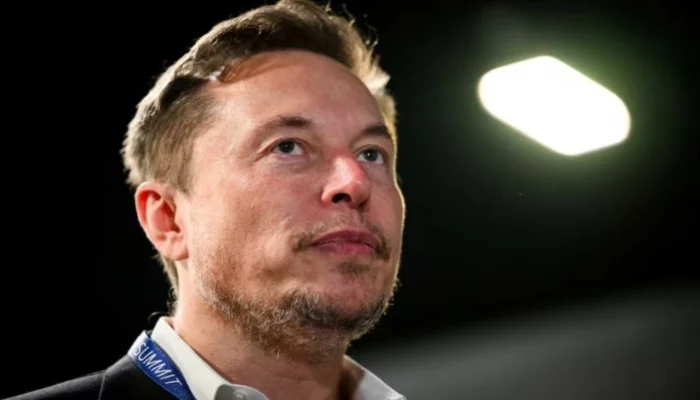
Tesla CEO Elon Musk has reportedly postponed his much-anticipated visit to India, according to CNBC-TV18 citing sources familiar with the development.
The immediate reasons for the postponement are not known as yet, Business Today reported.
Musk was scheduled to visit India on April 21 and 22 to meet with Prime Minister Narendra Modi and announce plans to enter the Indian market.
Earlier this month, Musk, 52, announced that he would soon visit the country and meet with PM Modi, 73, garnering much attention worldwide.
In a post on X, formally known as Twitter, he wrote: “Looking forward to meeting with Prime Minister @NarendraModi in India."
Many suspected that the tech billionaire might be visiting India to propose setting up manufacturing facilities for Tesla in the country as people linked his tweet to a notification from the Union government from a few weeks ago.
The notification was about a new electric vehicle manufacturing policy that allows the government to give duty concessions to electric car companies committing to make in India.
According to the earlier proposed plan, the Tesla CEO was supposed to be in India for 48 hours, meeting the PM, space startups and business leaders.
Musk was expected to engage in discussions with startups at Bharat Mandapam, an exhibition hall.
However, it's uncertain whether the Starlink agreement will be finalised during this trip as sources said the final nod from India's Ministry of Home Affairs is still awaited.
The postponement of the tech mogul’s visit comes ahead of major elections in the country with Modi likely to win.
With the model code of conduct in place, a formal announcement on Starlink may not happen, according to Business Today.
The SpaceX CEO previously met with Modi in June last year during the PM’s visit to the US where Musk had revealed plans to visit India in 2024, while expressing confidence that his electric vehicle company will enter the Indian market soon.
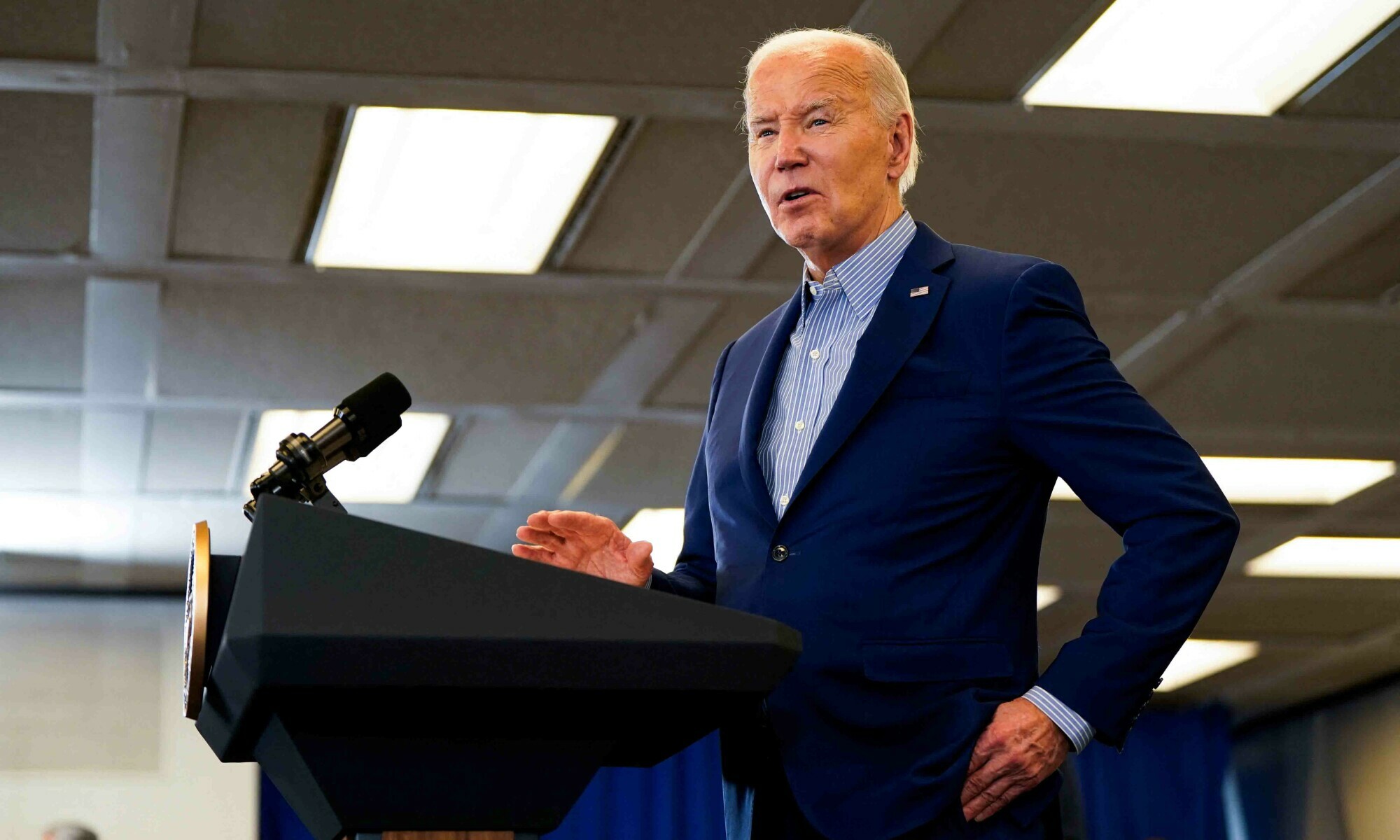
Beijing on Thursday accused the United States of hypocrisy in response to accusations by President Joe Biden that China is “xenophobic” and “cheating” on trade.
“I would like to ask him: are you talking about China or the US itself?” foreign ministry spokesman Lin Jian said when asked about the comments.
In a speech on Wednesday to union members, Biden called for a hike in steel tariffs on China, accusing it of cheating as he courted blue-collar voters on an election campaign trip to the battleground state of Pennsylvania.
“They’re not competing, they’re cheating. They’re cheating and we’ve seen the damage here in America,” the 81-year-old Biden said to cheers at the headquarters of the United Steelworkers union in Pittsburgh.
The Democrat said Chinese steel companies “don’t need to worry about making a profit because the Chinese government is subsidising them so heavily”.
Biden said he had called for the US Trade Representative to triple the tariff rates for Chinese steel and aluminium if Beijing was confirmed to be using anti-competitive practices.
“They’re xenophobic,” he added. “They’ve got real problems. I’m not looking for a fight with China, I’m looking for competition — but fair competition.”
Beijing and Washington have clashed in recent years on flashpoint issues from technology and trade to human rights as well as over the self-ruled island of Taiwan and the disputed South China Sea.
Relations have stabilised somewhat since Presidents Biden and Xi Jinping met in San Francisco in November for talks that both sides described as a qualified success.
The two held a follow-up telephone call this month, where they clashed over US trade restrictions on technology and on Taiwan, which Beijing claims.
But they also agreed that two high-level US officials would soon travel to China — US Treasury Secretary Janet Yellen visited last week, with top diplomat Antony Blinken due in Beijing soon.
The US also this week announced a probe into China’s trade practices in the shipbuilding, maritime and logistics sectors.
China’s commerce ministry hit back, saying the probe was “full of false accusations, misinterpreting normal trade and investment activities as harming US national security and corporate interests, and blaming China for its own industrial problems”.
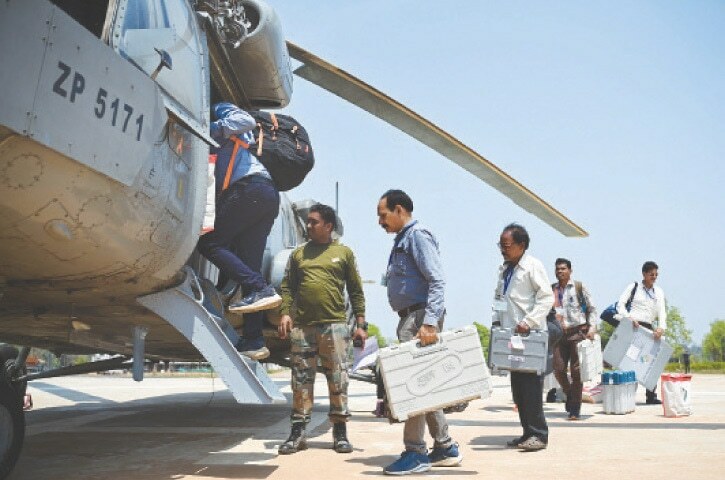
NEW DELHI: India begins its crucial national elections on Friday amid hopes and fears for its troubled democracy.
Prime Minister Narendra Modi, the most right-wing leader to head the country, is hoping to win a third consecutive term, the first time since Jawaharlal Nehru, while his rejuvenated rivals say he could lose.
Mr Modi says he is confident of getting more than 400 seats in the 18th Lok Sabha, a brute majority of in the 545-seat lower house, a feat achieved only once by Rajiv Gandhi.
The Bharatiya Janata Party hopes to increase its tally from 303 to 370, the rest coming from other members of the ruling National Democratic Alliance (NDA). It is widely feared that Mr Modi would seek to use the majority to change the constitution to align with his idea of Hindu Rashtra.
Opposition sees an opening for itself in PM’s northern stronghold; Modi says he is confident of getting more than 400 seats in Lok Sabha
Mr Modi’s hitherto fractious rivals comprising regional parties plus the Congress, recently cobbled the India National Development Inclusive Alliance (INDIA) bloc. They are pitching for the removal of the NDA from power for its “whimsical policies, narcissistic hegemony, communal avowal as well as violence against the minorities and the fear factor against any dissent”.
Ground reports say there is no Modi wave evident in any part of the country, but these are early days. The biggest chunk of seats will be in the fray on Friday, covering 102 races in 21 states. The remaining six phases of the polls, including the last leg on June 1, will make these the longest elections in memory. Security is cited as the reason, and it would involve the deployment of 3.4 lakh paramilitary forces in rotation.
West Bengal, where the Bharatiya Janata Party is hoping to expand from the 18 of 42 seats it won last time, would see polls in all seven phases. A maximum of 92,000 security personnel are likely to be deployed there.
The BJP had just two seats in the state in 2014.
The NDA is banking largely on the so-called Modi magic together with the Ram Mandir and the abrogation of Article 370 in Jammu and Kashmir. Every BJP leader is reinforcing Hindutva, which otherises the Muslims. The BJP’s manifesto is personalised as ‘Modi ki Guarantee’, with the programmes of a decade-long rule listed. The Congress’s promise of ten forms of justice has fresh appeal: “We promise you greater freedom, faster growth, more equitable development and justice for all.”
The rub however is in the numbers. Mr Modi’s 39 per cent votes got him 55 per cent seats in 2019. In so doing, he obviously won by dividing the 61 per cent votes cast for non-BJP parties.
The opposition sees in this a chance, which requires it to unite where it matters. The question is where would Mr Modi find the extra 67 opposition seats while not losing any of his to account for the BJP’s goal of hitting 370 without allies.
The opposition sees an opening for itself in Mr Modi’s northern stronghold. Much has changed since 2019 when he won all seven seats in Delhi, all 10 in Haryana, all 25 in Rajasthan, 25 of 48 in Maharashtra, 27 of 29 in Madhya Pradesh, all 26 in Gujarat, 62 of 80 in Uttar Pradesh, 22 of 40 in Bihar, all five in Uttarakhand and all four in Himachal Pradesh.
That adds up to 213 seats for the BJP from the northern stronghold. Elsewhere, the BJP picked up 25 out of 28 in Karnataka, eight of 21 in Odisha and four from 17 in Telangana. The BJP won two seats from 25 in Andhra Pradesh. It’s saturated in the north and in the absence of a divisive issue clicking, the chances are it could only go down from there.
In Karnataka, Telangana and Himachal Pradesh the Congress has taken power since the last elections. The BJP might improve its tally in Andhra Pradesh where it has cobbled an alliance with the Telugu Desam. Wild guesses have been made, however. Rahul Gandhi says the Modi alliance could be restricted to 180, nearly a hundred short of a majority.
Shiv Sena’s Uadhav Thackeray on whose strength the BJP won handsomely in Maharashtra feels, not without a tinge of bitterness that the BJP would get just 45 seats. And the Trinamool Congress of West Bengal says it would get twice the number of seats than the BJP in the state, which should worry Mr Modi’s supporters.
After the Muzaffarnagar communal polarisation of 2014 and Pulwama-Balakot nationalist fervour fuelled his campaign in 2019, the Modi souffle has so far failed to rise again.


